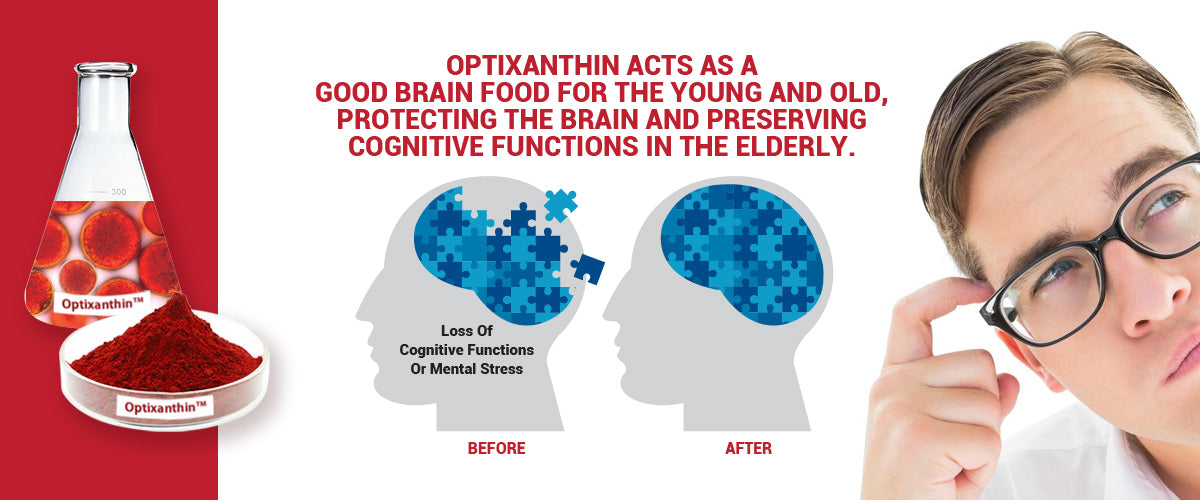The neuroprotective role of astaxanthin
The brain is the primary control center of the body; processing information from the body, operating internal organs, generating thoughts and emotions, storing and allowing for recall of memories and controlling movement. Because the brain has such a vital and complex role in controlling the body´s functions, it has an excellent defence system. Firstly, it is well protected by the blood brain barrier, which prevents harmful substances from reaching it. Secondly, the brain has a specialized immune system that monitors the presence of any intruders or the formation of internal injuries.
Nevertheless, the brain remains vulnerable to attack and damage by free radicals, especially in people over the age of 50 in whom the brain’s natural antioxidant enzymes progressively lose effectiveness. In fact, excessive and persistent oxidative stress and chronic inflammation in the brain have been linked to the development and progression of neurodegenerative conditions such as Alzheimer’s disease and Parkinson’s disease and to cerebrovascular diseases, such as ischemic stroke and vascular dementia.
Natural astaxanthin can cross the blood-brain barrier, providing ultimate protection for the brain
The health of the brain plays a critical role in almost everything required of the human body. For these reasons, neurologists and experts have started to pay close attention to the preventive and therapeutic effects of micronutrients on brain health. A number of clinical and experimental studies suggest that natural astaxanthin supplementation may play a role in sustaining and supporting brain and cognitive health.
One of the common chronic neurodegenerative conditions, Alzheimer’s, is the cause of dementia among the elderly, which includes loss of cognitive functions such as memory, thinking, and behaviour. Alzheimer’s Disease International reported that, the prevalence of dementia in Malaysia was 123,000 people in 2015. By 2030, it was projected to reach 261,000 and will continue to increase to 590,000 people in 20501.
From the nutrition point of view, natural astaxanthin is considered one of the strongest antioxidant in nature, due to its high scavenging potential of free radicals in the human. Astaxanthin as a fat-soluble nutrient, is able to cross the blood-brain barrier, protecting the neurons against oxidative damage and quenching free radicals that injure brain cells. Recently astaxanthin is also receiving attention for its effect on the prevention and co-treatment of neurological pathologies, including Alzheimer and Parkinson’s disease2.
Researchers in Taiwan concluded that astaxanthin could be a potent brain protector and as a therapy for early stages of Alzheirmer’s disease3. The powerful antioxidant activity and uniqueness at the cell membrane of Astaxanthin protects against brain damage from insufficient oxygen delivery or ischemia4. Pre-treatment with astaxanthin for 5 hours and again 1 hour before ischemia also provided protection against brain damage5.
The antioxidant property also confers protection against acute ischemia-reperfusion injury to the brain that will result in a stroke. Both the animal and human studies indicated that astaxanthin improves memory and information-processing capacity in aging brains6.

Supplementation of Astaxanthin improves cognitive function
A randomized double-blind placebo-controlled studies have shown that 3 months supplementation of astaxanthin (12mg/daily) improved memory, mental quickness and multitasking in senior subjects complaining of age-related forgetfulness7.

Clinical studies also suggest that astaxanthin fights vascular dementia by reducing oxidative by-products in red blood cells – a primary factor for the prevention of vascular dementia.
Astaxanthin supplementation improves ADAS-cog subscale in MCI patients

Patients diagnosed with MCI: mild cognitive impairment under non-pharmacological therapy (n=98, aged ≥50) received 4 mg of astaxanthin daily in combination with Bacopa monnieri and other antioxidants for 60 days. A higher score indicates greater dysfuntion8.
Another study conducted in Nagoya University, Japan, found that human brain cells pre-treated with astaxanthin experience significant reduction in cell death due to neuronal damage9.
Clinical Benefits of Astaxanthin:

✔ Improves age-related forgetfulness, multitasking and alertness
✔ Decreases oxidation of red blood cells, which is linked to the prevention of dementia
✔ Enhances capillary blood flow and blood antioxidant quality
✔ Modulates blood pressure, thus lowering stroke risk and improving vascular endothelial health
References:
- A collaboration between International Medical University (IMU) and Alzheimer’s Disease Foundation of Malaysia (ADFM): Raising Awareness of Alzheimer’s in Malaysia. 6 September 2017.
- Ikeda, Y., et al. (2008). “Protective effects of astaxanthin on 6-hydroxydopamin-induced apoptosis in human neuroblastoma SH-SY5Y cells.” Journal of Neurochemistry. 107(6):1730-40.
- Chang, CH., et al. (2010). “Astaxanthin secured apoptotic death of PC12 cells induced by beta-amyloid peptide 25-35: Its molecular action targets.” Journal of Medicinal Food. 13(3):548-556.
- Curek, GD., et al. (2010). “Effect of astaxanthin on hepatocellular injury following ischemia/reperfusion.” Toxicology. 267(1- 3):147-153.
- Lu, YP., et al. (2010). “Neuroprotective effect of astaxanthin on H(2)O(2)-induced neurotoxicity in vitro and on focal cerebral ischemia in vivo.” Brain Research. 1360:40-48.
- Wang, HQ., et al. (2010). “Astaxanthin upregulates heme oxygenase-1 expression through ERK1/2 pathway and its protective effect against beta-amyloidinduced cytotoxicity in SH-SY5Y cells.” Brain Research. 1360:159-67.
- Katagiri et al., Effects of astaxanthin-rich Haematococcus pluvialis extract on cognitive function: a randomised, double-blind, placebo-controlled study. J Clin Biochem Nutr. 2012;51(2):102-7.
- Zanotta et al., Cognitive effects of a dietary supplement made from extract of Bacopa monnieri, astaxanthin, phosphatidylserine, and vitamin E in subjects with mild cognitive impairment: a noncomparative, exploratory clinical study. NeuroPshchiatric Dis. And Treatment 2014; 10; 225-230
- Liu, X., et al. (2009). “Astaxanthin inhibits reactive oxygen species mediated cellular toxicity in dopaminergic SH-SY5Y cells via mitochondria-targeted protective mechanism.” Brain Research. 1254:18-27.